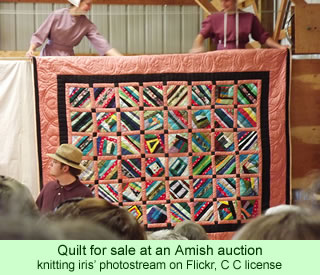The U.S. government shutdown because of Republican unhappiness with Obamacare prompts the question why the law exempts the Amish from the mandatory medical insurance provisions. According to a Reuters news story last week, the Amish don’t have to purchase the insurance because they insure themselves, within their own communities and in their own ways.
 An Amish carpenter told the reporter, “we have our own health care.” He added that when the Amish need medical care in a hospital, the church community will pay the bills if the family can’t. The reporter writes that the Amish handle medical bills that exceed the resources of individual families with auctions, church aid, and negotiated discounts with local hospitals, which accept cash payments in return for lower rates. The article expands on these points.
An Amish carpenter told the reporter, “we have our own health care.” He added that when the Amish need medical care in a hospital, the church community will pay the bills if the family can’t. The reporter writes that the Amish handle medical bills that exceed the resources of individual families with auctions, church aid, and negotiated discounts with local hospitals, which accept cash payments in return for lower rates. The article expands on these points.
The exemption for the Amish in the U.S. Patient Protection and Affordable Care Act of 2010—commonly referred to as the Affordable Care Act or simply as Obamacare—is really an extension of the much older Social Security system. The Amish refused to go along with the provisions of social security or to cooperate with the U.S. Internal Revenue Service, which was charged with taxing people like self-employed farmers.
According to Donald Kraybill, well-known expert on the Amish society, “there was an Amish guy who refused to pay Social Security. IRS agents confiscated his horses while he was out in the field plowing.” It was a public relations disaster.
But a 1965 U.S. law exempted the Amish from the requirement that they must participate in social security. The provisions of that law were then included in the Affordable Care Act to also exempt them from the newly mandated required individual health insurance. As Prof. Kraybill explained, “the basic religious reason driving their resistance [to insurance] is that, as a religious faith, the church community should take care of its own members.” He added that the Amish also come together to help out when other disasters occur, such as tornados or fires.
Some of the Amish in Lancaster County, Pennsylvania, carry identification cards—without photos—which identify them as members of an Amish community. The cards help area hospitals confirm that the bearer is a participant in a local Amish coverage plan.
An Amish man from Kinzers, a community to the east of Lancaster city, explained his opposition to taking aid from the government by saying, “we don’t want government paying for our things. We want to pay our own way.” He explained that most of the Amish families in Kinzers make monthly payments into a hospital aid fund. They also give free-will offerings when families are faced with extra large bills.
Their auctions can generate substantial funding to help with medical expenses. Nicknamed “mud sales” because of the conditions in the fields where they are usually held, these benefit auctions can raise a lot of money. The journalist attended one in Gordonville, another community east of Lancaster city, on a recent Saturday. Hand made quilts donated for the benefit auction went for several hundred dollars each, and used buggies sold for over $4,000 per buggy.
An Amish man at one auction summed all this up by saying that they often rely on assistance to pay their hospital bills. “It’s not stressful. It’s there when you need it.” Jan Bergen, the Chief Operating Officer at the Lancaster General Health System, a major hospital in Lancaster, summed up the Amish approach to medical costs in slightly different terms. “The way they come together to pay for health care is amazing. It’s a tithing. Their sense of responsibility extends beyond themselves and to the community.”